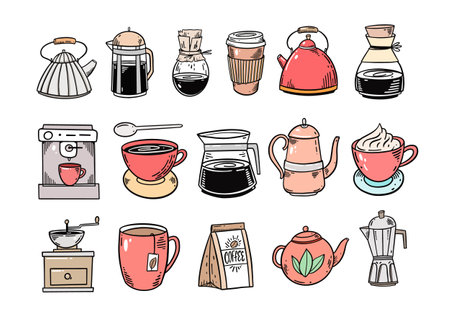Introduction to Eco-Friendly Coffee Storage
As Britain continues to champion sustainability, the way we store and enjoy our daily cup of coffee is increasingly coming under scrutiny. The importance of eco-friendly coffee storage goes beyond simply keeping your beans fresh; it’s about making choices that align with a broader commitment to environmental responsibility. With consumer awareness on the rise and more Britons questioning the impact of their everyday habits, sustainable coffee storage solutions are gaining prominence in kitchens across the UK. This shift is driven by growing concerns over plastic waste, carbon footprints, and the long-term health of our planet. Choosing environmentally conscious methods for storing coffee is now seen not just as a personal preference, but as an ethical obligation in line with Britain’s evolving green values. As we explore these options, it’s essential to understand why sustainable practices matter and how they can be seamlessly woven into our daily routines.
Common Environmental Issues with Conventional Storage
When it comes to coffee storage in Britain, traditional solutions often contribute to environmental problems that are difficult to ignore. Many households and cafes rely on single-use plastic containers or non-recyclable packaging to keep their beans fresh. Unfortunately, these materials are not only energy-intensive to produce but also present significant challenges when it comes to disposal and recycling. The UK’s recycling infrastructure, while improving, is still unable to process all forms of plastic packaging, leading to a considerable amount ending up in landfill or incineration plants.
The Impact of Single-Use Plastics
Single-use plastics dominate the coffee storage market due to their affordability and convenience. However, they are one of the main contributors to plastic pollution across Britain’s countryside and urban environments. Once disposed of, these plastics can take hundreds of years to break down, releasing microplastics into soils and waterways along the way.
Recyclability Challenges
Not all plastics used for coffee storage are recyclable in the UK. Laminated bags and multi-layered containers often contain materials that local councils cannot process. This leads to limited options for environmentally conscious consumers who wish to minimise waste.
Comparison Table: Common Conventional Storage Materials
| Material | Common Usage | Recyclability (UK) | Environmental Impact |
|---|---|---|---|
| Single-use Plastic Bags | Pre-packed ground coffee/beans | Poor | High; persistent landfill waste, microplastic pollution |
| Laminated Foil Bags | Specialty coffee packaging | Very Limited | Energy-intensive production, rarely recycled locally |
| Plastic Canisters | Reusable at home, but often disposed after short use | Varies (often not recycled due to mixed materials) | Significant landfill contribution if not reused properly |
| Tin or Steel Cans | Coffee tins for retail brands | Good (if clean and pure metal) | Lower than plastics but still resource-intensive to produce |
This reliance on conventional storage methods means that the British coffee industry—both at home and commercially—has a notable ecological footprint. Addressing these environmental issues starts with understanding the scale and scope of the problem embedded within our everyday choices.

3. Sustainable Materials and Product Options
When considering eco-friendly coffee storage solutions, the choice of material is crucial. In Britain, there is a growing demand for products that are both functional and environmentally responsible. Glass jars are a popular option, valued for their recyclability and inert properties that help preserve coffee freshness without imparting unwanted flavours. Many British brands, such as Kilner, offer robust glass containers with airtight lids—perfect for keeping your coffee beans or grounds in optimal condition.
Stainless steel canisters present another sustainable alternative. Not only are they durable and long-lasting, but their non-porous surfaces also protect against moisture and light. Companies like Zero Waste Club and Abeego supply stainless steel storage options designed with sustainability at their core, often incorporating UK-sourced materials and ethical manufacturing practices.
For those seeking single-use or portable solutions, biodegradable packaging is gaining traction in Britain’s eco-conscious market. Suppliers such as Vegware specialise in plant-based compostable materials suitable for short-term coffee storage or gifting. These biodegradable options significantly reduce landfill waste compared to traditional plastics.
It’s also worth noting the rise in refill schemes across the UK, where local zero-waste shops encourage customers to bring their own reusable containers to purchase freshly roasted beans. This not only cuts down on unnecessary packaging but also supports small-scale British roasters who prioritise ethical sourcing and sustainable business models.
By opting for these innovative materials and supporting British suppliers, consumers can make meaningful strides towards reducing their environmental impact while keeping their coffee fresher for longer.
4. Local and British-Made Solutions
When it comes to eco-friendly coffee storage, supporting local initiatives is not just about reducing carbon footprints—it’s also about strengthening the British economy and celebrating our unique approach to sustainability. Across the UK, a range of brands and artisans are championing green solutions for coffee lovers, proving that you don’t have to look far for innovation and ethical craftsmanship.
Leading British Brands in Sustainable Coffee Storage
Several homegrown businesses are at the forefront of sustainable coffee storage, offering products that marry function with environmental responsibility. Here are a few notable examples:
| Brand/Artisan | Main Product | Sustainable Features | Location |
|---|---|---|---|
| Aerden & Co. | Bamboo Canisters | Biodegradable materials, plastic-free packaging | Devon |
| The Zero Waste Company | Glass Storage Jars with Cork Lids | Locally sourced materials, refill schemes | Tunbridge Wells |
| Coffee & Kin | Reusable Tins and Pouches | Made from recycled metals, recyclable at end of life | Northumberland |
| The Good Dot | Ceramic Airtight Jars | Handmade, small-batch production, low-impact glazes | Liverpool |
Championing Artisans and Local Makers
Beyond established brands, independent potters, woodworkers, and craftspeople across Britain are producing bespoke storage options—often using locally sourced, reclaimed, or upcycled materials. Purchasing from these makers not only reduces transportation emissions but also supports traditional skills and regional economies.
Local Initiatives Making a Difference
- Refill Stations: Many towns now host refill shops where you can top up your existing containers with freshly roasted beans, cutting down on packaging waste.
- Community Workshops: Look out for workshops teaching how to make your own storage jars or upcycle old containers into something beautiful and practical.
- Sustainable Markets: Farmers’ markets and craft fairs often feature local eco-friendly brands—an excellent place to discover new favourites and meet the people behind them.
The Importance of Buying British-Made Solutions
Opting for locally produced coffee storage isn’t just an environmentally conscious choice; it’s an investment in British innovation and resilience. By prioritising domestic brands and makers, we collectively reduce import-related emissions while fostering a culture that values quality, longevity, and community connection. In short: keeping your coffee fresh has never felt more local—or more rewarding.
5. How to Properly Store Coffee Sustainably at Home
Storing coffee sustainably at home is not only about keeping your beans fresh, but also about reducing waste and environmental impact. For households across Britain, adopting eco-friendly storage practices can make a significant difference. Below, you’ll find practical advice and step-by-step guidelines tailored for UK homes.
Choose the Right Eco-Friendly Container
Select airtight containers made from sustainable materials such as glass, stainless steel, or recycled aluminium. Avoid single-use plastics or non-recyclable packaging. British brands often offer reusable canisters specifically designed for coffee storage—look out for those with silicone seals to maintain freshness without unnecessary plastic.
Store in the Perfect Spot
Keep your coffee away from direct sunlight, heat sources like radiators, and areas with fluctuating temperatures (such as near ovens or windowsills). A cool, dark cupboard is ideal in most UK homes. This helps retain the delicate flavours and aromas typical of quality beans purchased from local roasters or ethical supermarkets.
Step-by-Step Guide to Sustainable Coffee Storage
- Decant Immediately: Once you open your bag of beans or grounds, transfer them into your chosen eco-friendly container straight away to minimise air exposure.
- Seal Tightly: Always ensure the lid is firmly closed after each use to keep moisture and oxygen out.
- Avoid Refrigeration: While it may seem logical to store coffee in the fridge, this actually introduces unwanted moisture and odours. Room temperature is best for maintaining flavour in the UK climate.
- Buy Little and Often: Purchase smaller amounts of coffee more frequently from local suppliers. This reduces waste and ensures you’re always enjoying fresh brews without excess stock going stale.
Sustainable Disposal Tips
Once your coffee is finished, compost any biodegradable packaging if possible—many British councils offer food waste collections that accept compostable materials. Rinse out and reuse containers rather than discarding them, contributing further to a zero-waste lifestyle.
Final Thoughts on Minimising Impact
By following these straightforward steps, UK households can enjoy better-tasting coffee while lowering their environmental footprint. Small changes in daily habits—like switching to reusable containers and sourcing locally—can collectively make a positive impact for both your morning brew and the planet.
6. End-of-Life: Recycling and Reuse Practices
When it comes to eco-friendly coffee storage solutions in Britain, considering the end-of-life phase is just as vital as the initial purchase. Understanding how to responsibly dispose of or repurpose your storage containers helps close the sustainability loop and aligns with UK environmental values.
Recycling Options for Common Materials
Glass Jars: Most local councils across Britain provide kerbside glass recycling. Simply rinse out your empty coffee jars and place them in your recycling bin. Glass can be endlessly recycled without loss of quality, making it a top choice for eco-conscious consumers.
Metal Canisters: Stainless steel and tin coffee containers are generally accepted at household waste recycling centres (HWRCs). Check with your local authority, as some areas also accept these metals via kerbside collection. Remove any plastic or rubber seals first, as these may need separate disposal.
Bamboo and Wooden Containers: While these natural materials arent widely recycled through council collections, they can often be composted at home if untreated. Alternatively, use them in garden projects or donate them to community groups for reuse.
Plastic Lids and Containers: The UKs mixed plastics recycling infrastructure is improving, but not all types are accepted everywhere. Look for resin codes on the container base and consult your council’s guidelines. If recycling isnt an option, consider creative upcycling instead.
Creative Repurposing Ideas
Rather than sending old coffee storage containers straight to landfill, Britons are known for their ingenuity in reusing everyday items. Here are a few ideas tailored to the British home:
- Herb Planters: Transform glass jars or metal tins into windowsill herb gardens—a practical way to support home cooking and reduce waste.
- Loose Leaf Tea Caddies: Repurpose airtight canisters to store loose tea leaves, embracing Britain’s love of a good brew while minimising single-use packaging.
- Larder Organisation: Use old coffee jars for dried goods like lentils, pasta, or spices. Label them with chalk paint or reusable stickers for a tidy kitchen cupboard.
- Crafters’ Storage: Store buttons, sewing supplies, or small hardware items—perfect for hobbyists and DIY enthusiasts alike.
Navigating Local Resources
If you’re ever unsure about proper disposal routes in your area, check Recycle Now (recyclenow.com) or contact your local council directly. Many communities run repair cafés or swap shops where reusable items find new homes, keeping materials in circulation and out of landfill.
Sustainable Habits Start at Home
By considering the end-of-life options for your coffee storage solutions—whether through recycling or inventive reuse—you play a direct role in shaping a greener Britain. Every small action contributes towards nationwide efforts to reduce waste and promote circular living.
7. Conclusion: The Future of Sustainable Coffee Storage in Britain
As we reflect on the journey towards more eco-friendly coffee storage solutions, it’s clear that the UK is steadily embracing sustainable habits both at home and within the wider coffee community. We’ve discussed innovative storage options ranging from reusable tins to compostable bags, as well as the importance of proper preservation techniques that reduce waste and enhance flavour. By choosing sustainable packaging, supporting local British brands committed to environmental stewardship, and adopting mindful consumption habits, each of us contributes to a greener future.
The shift towards sustainability is not just a trend but an evolving movement. Across Britain, coffee shops and roasteries are increasingly prioritising plastic-free packaging, refill schemes, and partnerships with green suppliers. These collective actions set a strong example for consumers and inspire new approaches to waste reduction and responsible sourcing. As these trends gain momentum, they foster a culture where eco-conscious choices become second nature.
We encourage all readers to take practical steps: invest in durable containers, seek out compostable or recyclable packaging, and support businesses with transparent sustainability practices. Small changes in our daily routines can lead to significant positive impacts when embraced collectively.
Together, Britain’s coffee lovers have the opportunity to shape a future where enjoying a cup of coffee is not only about taste but also about caring for our planet. Let’s continue to innovate, support local initiatives, and champion greener habits—ensuring that every brew reflects our commitment to a more sustainable world.

